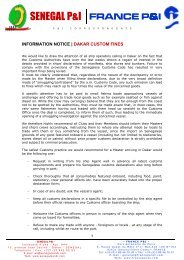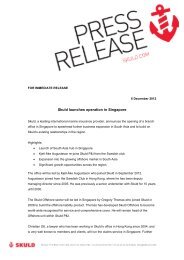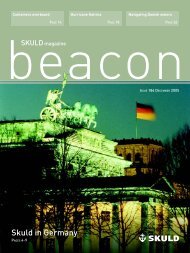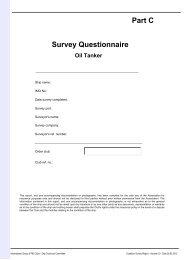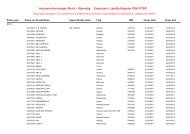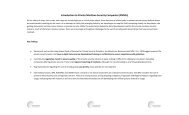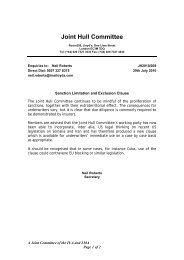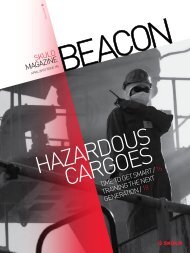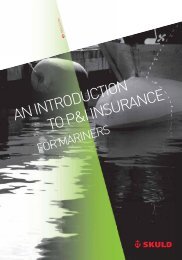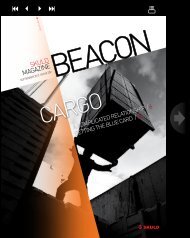Create successful ePaper yourself
Turn your PDF publications into a flip-book with our unique Google optimized e-Paper software.
The Master and crew should keep a close watch to ensure ROB<br />
surveys are conducted in accordance with MARPOL regulations<br />
practice and Masters/owners should be<br />
cautious to accept a letter of indemnity.<br />
When an indemnity is given in unlawful<br />
circumstances, such as when the Master<br />
knows the figures are incorrect and an<br />
innocent third party will rely on the<br />
statements, this is equivalent to fraud.<br />
Such an Indemnity would be unenforceable<br />
under English law and has no value,<br />
even where the charterers knew of the<br />
inaccuracy ref: "NOGAR MARIN" [1998]<br />
Lloyd’s rep. 412. Further, the owners will<br />
prejudice the P&I cover as a bill of lading<br />
known to contain an incorrect description<br />
is excluded from cover, ref. rule 5.2.5.<br />
Challenging bill of lading figures<br />
How can owners challenge the bill of<br />
lading figures? In the New Chinese<br />
Antimony Co. Ltd. v Ocean Steamship Co.<br />
Ltd. [1917] 2 KB 664, the Master had been<br />
unable to satisfy himself as to the weight<br />
or quantity of cargo loaded on board the<br />
vessel and in order to protect owner’s<br />
interests, he endorsed the bill of lading<br />
with the words, "weight or quantity<br />
unknown". The Court decided that the<br />
...THE OWNERS WILL PREJUDICE THE<br />
P&I COVER AS A BILL OF LADING<br />
KNOWN TO CONTAIN AN INCORRECT<br />
DESCRIPTION IS EXCLUDED FROM<br />
COVER, REF. RULE 5.2.5.<br />
bill of lading was not prima facie<br />
evidence against the shipowner of the<br />
quantity shipped and the burden of proof<br />
was on the cargo owner to prove what, in<br />
fact, was shipped. However, owners<br />
should bear in mind that under English<br />
law this does not afford complete<br />
protection if the discrepancy between the<br />
vessel’s figure and the shore figure is so<br />
great that this would have been obvious<br />
to the Master, ref. Conoco Ltd. and Others<br />
v Limni Maritime Co. Ltd. (the Sirina) [1988]<br />
2 Lloyd’s rep. 613.<br />
Clausing the bill of lading<br />
Other jurisdictions may not follow the<br />
approach adopted by the English Courts<br />
and qualifying clauses as ‘weight, quantity,<br />
etc. unknown’ are often ignored completely.<br />
However, the recommendation is to clause<br />
the bill of lading as necessary, either by<br />
inserting the ship figure and/or with<br />
qualifying words such as weight…unknown<br />
or similar.<br />
Should the owners want to challenge the<br />
figures inserted in the bill of lading<br />
before signing, some helpful guidance<br />
can be found in the English Court<br />
decisions, the Boukadora [1989] 1 Lloyd’s<br />
rep. 393. This was addressed in <strong>Beacon</strong><br />
no. 2, December 2003, page 13. However,<br />
in short the Court said that, even if the<br />
charterparty requires the Master to sign<br />
bills as presented, this does not mean<br />
that the Master is bound to sign bills "in<br />
whatever terms the charterer chose to<br />
demand". "There is…a basic and implied<br />
requirement that the bills as presented<br />
should relate to the goods actually<br />
shipped and shall not contain<br />
misdescription of the goods…" The Court<br />
held that the owners were entitled to<br />
recover their loss from the charterers.<br />
...THE RECOMMENDATION IS TO<br />
CLAUSE THE BILL OF LADING AS<br />
NECESSARY, EITHER BY INSERTING<br />
THE SHIP FIGURE AND/OR WITH<br />
QUALIFYING WORDS SUCH AS<br />
WEIGHT…UNKNOWN OR SIMILAR.<br />
Trade allowance<br />
It is common to counter any claim for<br />
shortage with the loss is within the<br />
‘customary allowance’ of 0.5%, often<br />
referred to as the ‘trade allowance’.<br />
However, English law is clear on this<br />
issue and does not accept this custom<br />
unless the ‘trade allowance’ is referred<br />
to in the contract of carriage. The Court<br />
will consider the evidence placed before<br />
it, and with the expert evidence<br />
presented in a particular case, they will<br />
decide whether any allowance for transit<br />
loss should be made. In the Indian Oil<br />
Corporation Ltd. v Greenstone Shipping SA<br />
(the Ypatianna) [1987] 2 Lloyd’s Rep. 286<br />
the court accepted a 0.55% tolerance<br />
comprised of 0.30% with respect to water<br />
and sediment in the crude oil cargo and<br />
0.25% with respect to vapour loss.<br />
28 BEACON


